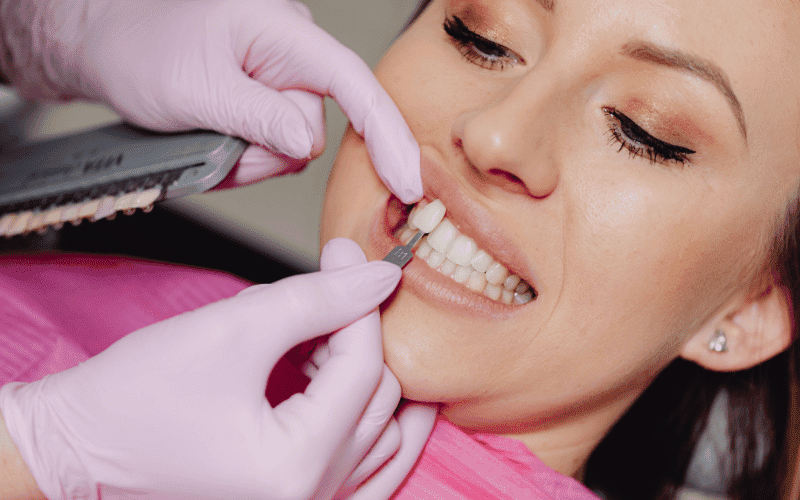ONLINE SCHEDULING AND VIRTUAL CONSULTS AVAILABLE

Is Your Veneer Loose or Fallen Off? Here’s What to Do Next

A dental veneer is your smile’s best friend, but what happens when it starts to loosen or falls off completely?
f you’re suddenly dealing with a wobbly veneer or, worse, holding it in your hand, you might be feeling a mix of panic and confusion. But don’t worry—you’re not alone, and there’s a clear path forward to fix the problem.
Veneers can loosen or detach for various reasons, from biting into something too hard to normal wear and tear. Ignoring the issue can lead to more significant dental problems, so it’s essential to act quickly.
In this blog, we’ll guide you through everything you need to know, from spotting the early signs of a loose veneer to taking immediate steps when it falls off. Whether you’re dealing with a minor wobble or a full-on veneer crisis, we’ve got you covered.
Why Veneers Come Loose or Fall Off
Veneers are durable but not invincible. Several factors can cause them to loosen or detach entirely. Understanding these causes can help you avoid common pitfalls.
- Biting into Hard Foods: Crunching down on nuts, ice, or hard candies can weaken the adhesive bond, making your veneer more likely to loosen or fall off.
- Wear and Tear: Over time, veneers can experience natural degradation, especially if they’ve been in place for many years.
- Oral Hygiene: Neglecting your brushing and flossing routine can lead to gum disease. As gums recede, veneers may lose their grip on your teeth.
- Tooth Decay: If decay develops under the veneer, the tooth structure may change, causing the veneer to loosen.
- Teeth Grinding: Bruxism, or grinding your teeth at night, applies constant pressure that can gradually pry veneers loose.
Understanding these causes can help you take preventive measures and maintain the integrity of your veneers.
Early Signs Your Veneer Might Be Loose
Catching a loose veneer early can save you from more significant issues later. Here’s how to identify the early warning signs:
- Movement or Wobble: If your veneer feels like it’s shifting when you press on it with your tongue, it could be coming loose.
- Discomfort or Ache: A subtle ache or discomfort in the tooth beneath the veneer might indicate that it’s not sitting correctly or there’s an underlying issue.
- Misalignment: Notice if your veneer seems slightly out of alignment compared to your other teeth. This subtle shift could signal trouble.
- Food Traps: Increased food particles getting stuck around the edges of the veneer may indicate a weakening bond, creating small gaps.
If you notice any of these signs, don’t wait. Schedule a visit to your dentist for a quick check-up and possibly avoid a more serious issue.
What To Do If Your Veneer Falls Off?
If your veneer Plantation has already fallen off, it’s essential to act quickly and calmly:
- Secure the Veneer: Place the veneer in a safe container. Avoid wrapping it in tissue, as it might get accidentally discarded.
- Rinse Your Mouth: Clean the area with warm water to remove any debris and reduce the risk of irritation or infection.
- Temporary Protection: If the exposed tooth is sensitive, apply a small amount of dental adhesive or toothpaste to protect it temporarily.
- Contact Your Dentist: Call your dentist immediately to explain the situation and arrange an appointment.
- Avoid Chewing on the Affected Side: To protect the exposed tooth, avoid using it to chew until the veneer is reattached.
- Pain Relief: If you’re experiencing discomfort, over-the-counter pain relievers like ibuprofen can help until you see your dentist.
Acting quickly can prevent further damage and make it easier for your dentist to restore your smile.
Steps Your Dentist Will Take
When you visit your dentist after losing a veneer, they’ll follow a structured process to resolve the issue:
- Examination: The dentist will examine the tooth and veneer to determine why it fell off and assess the tooth’s current condition.
- Cleaning and Bonding: If the veneer and tooth are still in good shape, the dentist will clean both surfaces and reapply a bonding agent to secure the veneer back in place.
- Addressing Underlying Issues: If there’s tooth decay or damage, your dentist might need to treat that first. This could involve filling cavities or performing a root canal if necessary.
- Replacement Veneer: If the original veneer is damaged, your dentist will take impressions to create a new veneer that fits perfectly with your tooth’s current structure.
- Discussing Options: Your dentist will talk you through your options, including material choices and costs, ensuring you get the best match for your smile.
This process aims to restore both the function and appearance of your tooth as quickly as possible.
Preventing Future Veneer Issues
Preventing future issues with your veneers involves a combination of good habits and regular dental care:
- Maintain Good Oral Hygiene: Brush twice daily and floss regularly to prevent gum disease and tooth decay. Both can weaken the bond between your tooth and the veneer.
- Regular Dental Check-Ups: Schedule regular visits to your dentist. These check-ups can catch early signs of problems and address them before they worsen.
- Avoid Hard Foods: Stay away from hard foods like nuts, ice, and candies that can stress your veneers.
- Use a Night Guard: If you grind your teeth at night, a night guard can protect your veneers from the constant pressure that can cause them to loosen.
- Stay Vigilant: Pay attention to any discomfort or changes with your veneers. Early intervention can extend their lifespan and save you from more significant issues down the road.
Taking these steps can help ensure that your veneers last as long as possible, keeping your smile intact.
Dealing with a loose or fallen veneer can be stressful, but knowing how to respond can make a big difference. Act quickly by securing the veneer, protecting the exposed tooth, and scheduling a visit with your dentist. Regular maintenance and good oral hygiene are key to preventing future issues. By staying proactive and informed, you can keep your veneers in top condition and enjoy a beautiful smile for years to come.





